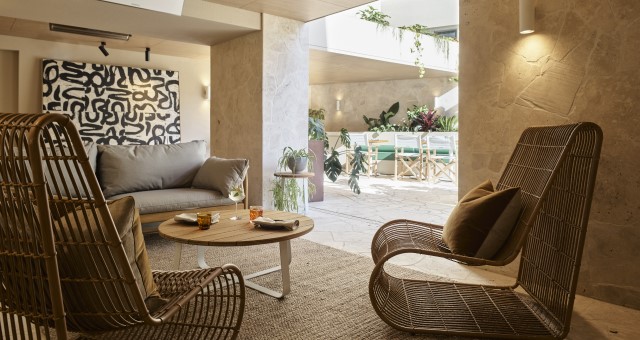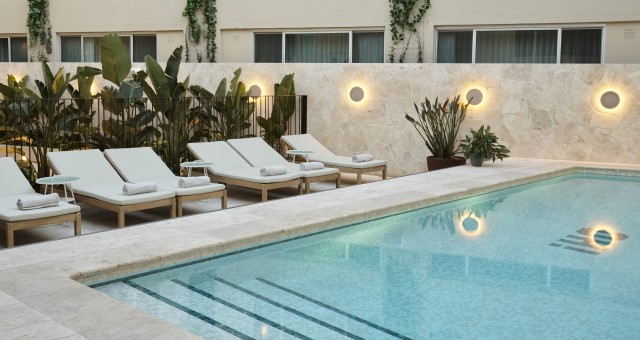Sydney-born Public Hospitality Group is perhaps best known for its thriving network of pubs and bars, which includes the likes of The Norfolk Hotel and Maybe Sammy, but over the last 12 months, the business has been investing heavily in its accommodation offering, giving rise to a growing portfolio of boutique lifestyle hotels.
“It started with those more traditional pubs where we’ve elevated the food beverage offering and, in some cases, where there’s been those extra floors above, we’ve put in boutique hotel rooms, a rooftop bar, gardens – whatever made sense for the space,” explained Public Group General Manager of Hotels, Joanne Sproule.
But taking the leap into hotels has been “a long time coming”, according to Sproule.
“It has been a long-time plan for our owner and founder, Jon Adgemis,” she told HM exclusively.
“He has held a lot of these properties privately for a long time and coming out of the pandemic, he wanted to create a management company to bring them back into the neighbourhoods in which they existed.”
Public owns around 20 properties – mainly in Sydney and Melbourne with some in the Northern Rivers region of New South Wales – about half of which are operational.
Its recent hotel openings include the 56-room Oxford House in Paddington with three food and beverage venues, which opened in August last year, and The Strand Hotel – a 100-year-old pub turned dining and hotel precinct.
A stylish boutique offering at the former Noah’s Backpacker hostel at Bondi Beach is among the hotels to open over the next six months. Public purchased the 260-bed property in June 2022 for a reported AU$68 million.
“In the last two years, we’ve acquired more traditional hotels,” Sproule said.
“We’ve got some other more lifestyle hotels coming to market over the next six to 12 months and we’re going to be adding about 200 rooms into the Sydney [hotels] landscape.”
With its recently opened hotels, Public is seeing strong occupancy rates continue.
“With The Strand Hotel, which has been open 12 months, we’re certainly hitting our stride. We’re getting consistently higher occupancies and a lot of repeat business,” Sproule said.
“At Oxford House, we had a huge amount of success when we opened and had a really booming summer. We’ve seen the occupancies continue through these cooler months.
“We’re not full – it’s winter in Sydney, and we’re not in the CBD – but we’re really happy and we haven’t had to rely on OTAs for Oxford House which has been a really a really, really pleasing result for our business.”
Discerning travellers, young at heart
The guest experience at a Public hotel aims to go beyond the basics of a comfortable room and polite staff to deliver an authentic experience and connection to the local neighbourhood.
“We’re definitely approachable in our style of hospitality. It’s not necessarily for the young, probably just the young at heart,” Sproule said.
“It’s about what we’re curating inside the building, whether it be the music, the art, bespoke menus, and really being in tune with what the guests need in each venue, because they are all different.
“We’re taking on these buildings that already means so much to the community, and the people around them, so it’s about making sure that we’re being respectful to the place and the building when we’re renovating and bringing in new businesses.”
Start-up mindset
Being smaller in size, gives Public the advantage of being closer to the guest and getting to know their preferences, according to Sproule.
“I don’t think we’ll ever do a 600-room hotel,” she said.
“Around the 50-100 mark where we can have one or two really successful food and beverage offerings with a spa or another area that brings in that lifestyle element – that’s definitely the sweet spot for our business.
“Once you get over 80-100 rooms, it starts becoming quite transactional and having the time to spend with each guest during check in or at the restaurant or bar becomes quite hard.”
As an owner and operator, Public maintains a startup mentality, according to Sproule, with a team that’s like “one big family”.
“There’s days where we have to help move mattresses,” she said.
“It definitely has that family business undertone, which I think is really important to the key members of the business.”
The business places a big focus on staff training and retention to maintain a strong core team of hospitality professionals from a variety of backgrounds.
But Sproule said recent changes to student working hours, which will be capped at 48 hours per fortnight from July 1, will be hard on teams and the hospitality industry more broadly.
“It’s really tough on the staff having to survive on 24 hours work a week when they have to pay rent in one of the world’s most expensive cities,” she said.
“These are the students doing the night shifts – the early mornings and late nights – they’re the backbone of our industry, and we really rely on them to be able to do those hours.”




